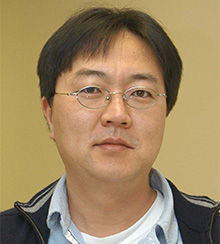Faulty List At SAIHST, we have faculties from various backgrounds such as ; basic science, clinical medicine, pharmacology, engineering, business etc. SAIHST is always open for future competent faculties to lead biomedical science.
| KIM, JEONG HOON / Ph.D. |
 Name : KIM, JEONG HOON Ph.D.
Department : SAIHST
Title : Associate Professor
Campus : SMC Campus
Office : Samsung Comprehensice Cancer Center B4-145
E-mail : jeongkim@skku.edu
Homepage :
Lab. title : Laboratory of Nuclear Receptor Coactivator
Related Department : Department of Health Sciences and Technology
Print
PDF Download
Name : KIM, JEONG HOON Ph.D.
Department : SAIHST
Title : Associate Professor
Campus : SMC Campus
Office : Samsung Comprehensice Cancer Center B4-145
E-mail : jeongkim@skku.edu
Homepage :
Lab. title : Laboratory of Nuclear Receptor Coactivator
Related Department : Department of Health Sciences and Technology
Print
PDF Download
|
|
■ Careers
1987~1991 BS, Yonsei University (Biology) 1991~1993 MS, Yonsei University (Microbiology) 1993~2000 Senior scientist, ChoongWae Pharmaceutical Co. 2000~2004 Ph.D., University of Southern California (Pathology) 2004~2009 Post-doc, University of Southern California (Biochemistry and Molecular Biology) 2009~present Associate Professor, Sungkyunkwan University, SAIHST ■ Research Summary The research focus of our laboratory is the mechanism of nuclear receptor-mediated transcription. We have discovered several new proteins, called transcriptional coactivators, which interact with the activated nuclear receptors, facilitate transcription complex formation, and help to recruit basal transcription machinery including RNA polymerase II to the promoter. We have recently discovered a coactivator called CCAR1 which acts as a physical link between p160 coactivators and Mediator complex and thereby facilitates recruitment of RNA polymerase II to the promoter of nuclear receptor target genes. The study of coactivators has recently become one of the most exciting and fast-moving areas of the nuclear receptor and gene regulation fields; it provides an exciting opportunity to extend our understanding of the mechanism of transcriptional enhancement by steroid hormones. In addition to their roles in normal function, steroid hormones play crucial roles in many types of cancer; both the hormones and their synthetic antagonists are used in therapy for many types of cancer. A more complete understanding of how these hormones and their receptors and coactivators regulate gene expression should provide new insights into cancer biology and suggest new strategies for therapy. ■ Keyword Nuclear receptor, Coactivator, Transcriptional regulation, Gene regulation, Estrogen receptor, Breast cancer ■ Selected Publications 1. Positive regulation of β-catenin-PROX1 signaling axis by DBC1 in colon cancer progression. Oncogene. 2015. Oct. doi: 10.1038/onc.2015.401. [Epub ahead of print] 2. A positive role of DBC1 in PEA3-mediated progression of estrogen receptor-negative breast cancer. Oncogene. 2015. 34:4500-4508 3. ZNF282 (Zinc finger protein 282), a novel E2F1 co-activator, promotes esophageal squamous cell carcinoma. Oncotarget. 2014. 5:12260-12272 4. CCAR1 promotes chromatin loading of androgen receptor (AR) transcription complex by stabilizing the association between AR and GATA2. Nucleic Acids Research. 2013. 41:8526-8536 5. SUMOylation of ZFP282 potentiates its positive effect on estrogen signaling in breast tumorigenesis. Oncogene. 2015. 32:4160-4168 |

